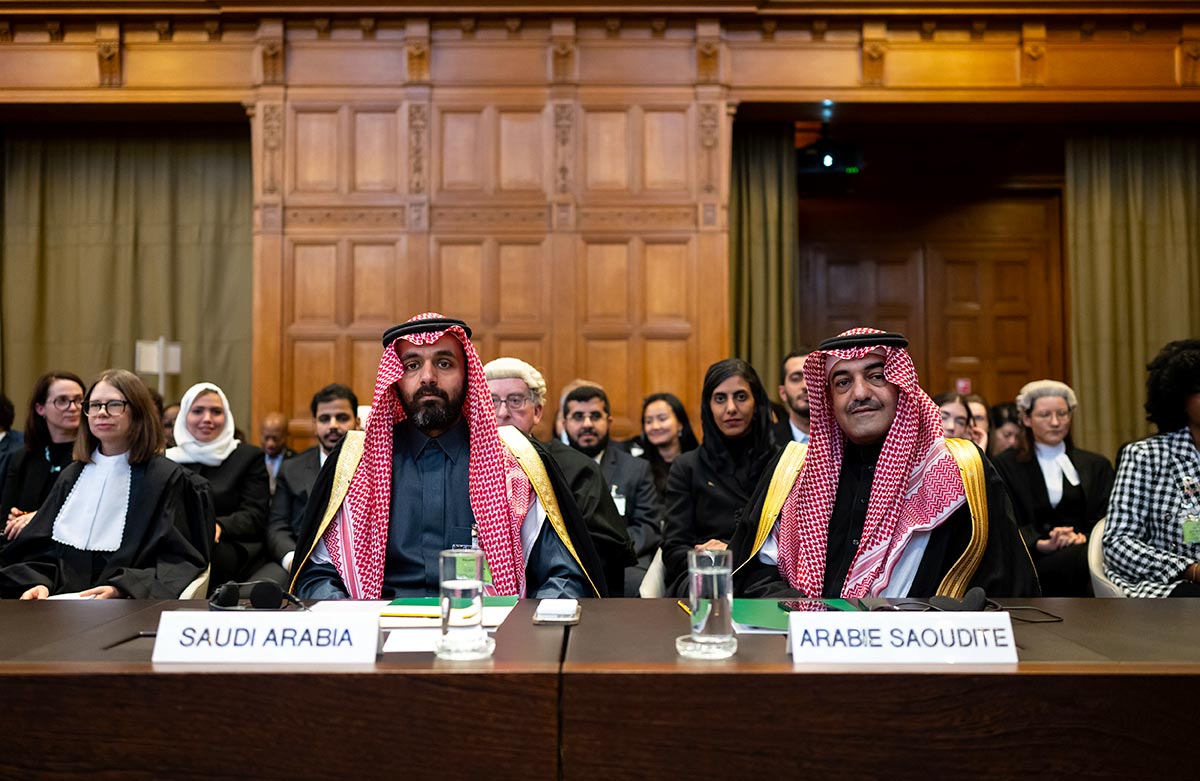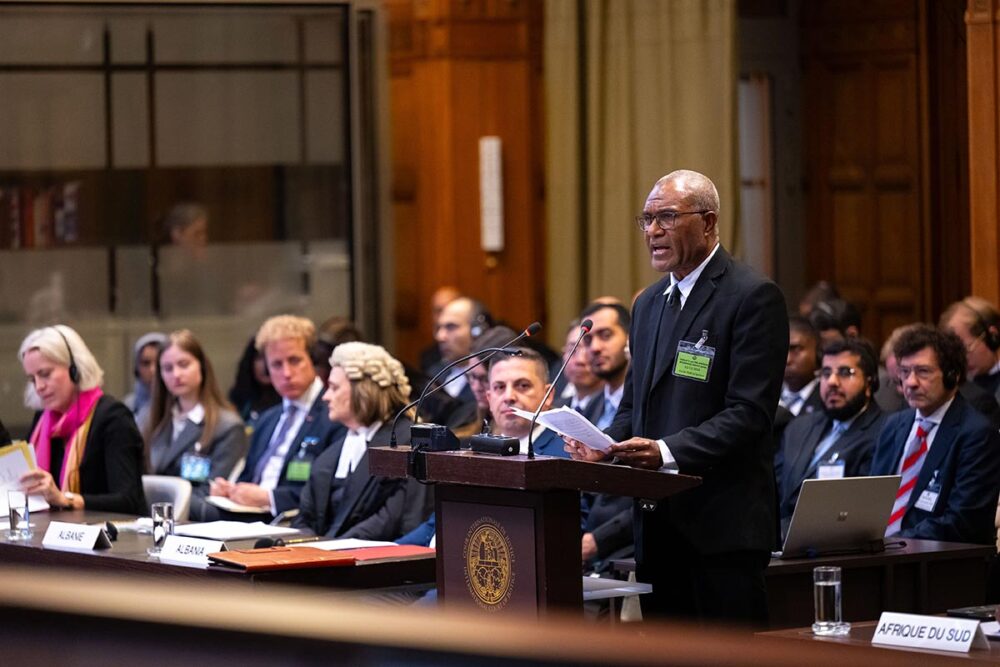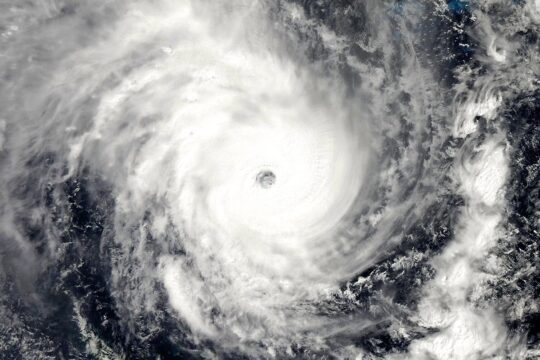From December 2 to 13, the hearings for the largest case ever before the International Court of Justice (ICJ) took place. Over 100 nations and international organisations addressed the judges in the Hague on the legal obligations of polluting states to combat climate change and protect the countries and the communities most affected.
This compelling legal case is led by the Global South, said Arnold Kiel Loughman, attorney general for the Republic of Vanuatu, in a 13 December 2024 statement, as the proceedings came to an end. “Historical polluters are responsible for the harm that our small island state and many other nations have been left to deal with as a result of climate change impacts, while uncurbed greenhouse gas emissions, fossil fuel subsidies and ongoing exploration and extraction from these same historical polluters continue to fuel the climate crisis.”
Vanuatu, an archipelago of 83 small islands in the Pacific Ocean, spearheaded the 2023 resolution by the United Nations General Assembly to request the UN’s highest court for an advisory opinion on two main questions. First, “what are the obligations of States under international law to ensure the protection of the climate system and other parts of the environment from anthropogenic emissions of greenhouse gases for states and for present and future generations?”. Second, what are the legal consequences for States which “by their acts and omissions have caused significant harm” to the environment, especially in relation to small island nations and vulnerable communities.
“All rise for climate justice”
At the start of the hearings, a few dozen protesters gathered outside the gate of the Hague Peace Palace with banners bearing messages such as “all rise for climate justice”. Inside the court, representatives, lawyers and legal advisors of dozens of states took place on the benches, some dressed in traditional outfits and a few of the representatives of the small island states wearing necklaces and headdresses made of colourful beads.
“This may well be the most consequential case in the history of humanity,” said on the first day of hearings Ralph Regenvanu, special envoy for climate change and environment of the Republic of Vanuatu. “Our peoples have built vibrant cultures and traditions over millennia that are intimately intertwined with our ancestral lands and seas. Yet today, we find ourselves on the frontlines of a crisis we did not create ⎯ a crisis that threatens our very existence and that of so many other peoples.”
“We look to the Court for recognition that the conduct which has already caused immense harm to my people and so many others is unlawful, that it must cease, and that its consequences must be repaired,” added Regenvanu addressing the top UN court. His country is part of the Melanesian Spearhead Group, a sub-region of Oceania in the southwestern Pacific Ocean, which also includes Fiji, Papua New Guinea, Solomon Islands, and New Caledonia. The islands, as well as many other nations severely impacted by the consequences of climate change in Asia and Africa, echoed Vanuatu’s arguments.
“This has been a massive and historic moment for climate justice,” Vishal Prasad, the campaign director of the Pacific islands students fighting climate change, said to Justice Info. This youth group came up with the idea to take this case to the ICJ and campaigned for Vanuatu to push the UN to request an advisory opinion. “Working through this for five years and finally getting to the ICJ was quite an emotional moment,” added Prasad.
The ICJ advisory opinions are not binding but they bear moral and political weight. And the Court’s opinion, which is already expected in 2025, has the power to influence climate litigations worldwide.
The right to self-determination and reparations
Margaretha Wewerinke-Singh, legal counsel for Vanuatu and the Melanesian spearhead group, demanded the Court to also establish the legal consequences of harming other states. On 2 December 2024, she argued that polluting nations should cease that conduct: “This means not only stopping actions that fuel the fire — such as expanding, and providing subsidies for fossil fuels — but also dismantling the systemic structures that drive emissions.”
She also spoke about assurances of non-repetition, “including effective safeguards against false solutions that risk aggravating the harm, such as geo-engineering”, as well as reparations. These can mean restitutions, such as ecosystem restoration, monetary compensation “for harms that cannot be undone”, and moral recognition, she added.
The Melanesian delegation also emphasised how climate change is impacting their right to life, to a healthy and clean environment and to self-determination. “Climate change is now robbing our peoples of their hard-won self-determination,” told the judges Ilan Kiloe, legal counsel for the Melanesian spearhead group, just a few decades after the islands “emerged from colonial rule”. He spoke loudly and passionately, wearing traditional strings of yellow beads around his neck. According to him, the climate crisis goes hand in hand with colonial history, as the many colonising countries are also responsible for the majority of greenhouse gas emissions.
“You possess the power to help us course-correct and renew hope in humanity’s ability to address the greatest challenge of our time,” said Cynthia Houniuhi, the president of the Pacific islands students fighting climate change, to the judges on 2 December 2024. Born in the Solomon Islands, a traditional decoration of red beads adorning her head, Houniuhi spelt out the translation for each concept in her native idiom: “It is upon our land (Mako) that our values and principles are rooted, preserved and transmitted across generations. Climate change is undermining our ability to uphold this sacred contract.”
The huge impacts of climate change
The catastrophic impact of the climate crisis on the Pacific communities has been widely documented by the Melanesian lawyers. One of them is Julian Aguon from Blue Ocean Law, a law firm. “There is a village at the mouth of a river in the gulf province of Papua New Guinea, that is on the roof again,” he said in a press conference at the Peace Palace on 2 December 2024. The people of Veraibari, “whose ancestors have lived along the banks of the Kikori River Delta since time immemorial, have already moved four times due to sea level rise. This will be their fifth and final relocation. Final, because there is simply no more inland to go”. Aguon stresses that as the sea level rises, burial grounds are washed away, schools and homes are inundated and farming land becomes unattainable.
The impacts are compounding and make it hard for communities to recover, said Prasad. Recent and recurring cyclones and other extreme weather events have in fact cost millions of dollars in recovery to the small islands. “We seem to be in that cycle of being hit by one climate impact after another, and being in this constant state of recovery. It’s very frustrating and saddening. We’ve known this problem for so long.”
“There is still time to avert the worst impacts if only States can make the necessary cuts to their greenhouse gas emissions,” said on the last day of hearings Eselealofa Apinelu, Secretary General of the Commission of small island States on climate change and international law.
The “business-as-usual approach” of polluters
Alternating to small islands and impacted nations, during the two weeks of hearings some countries voiced contrasting arguments. “To impose any obligations or consequences that go beyond or conflict with those contained in the specialised treaty regime on climate change [the Paris agreement and the UN Framework Convention on Climate Change, UNFCCC] would risk undermining the integrity of this regime” and impair future progress, Prince Jalawi Turki al Saud said on behalf of the Saudi government.

On the first day of the hearings, the German representative, Wiebke Rückert, stated that the Paris Agreement and the UNFCCC are the “decisive treaties when it comes to determining the legal obligations of States under international law in the context of global warming and climate change”. Rückert added that in these agreements the countries “have struck a careful balance between legally binding clauses and non-binding political commitments”.
China, the world’s largest emitter of greenhouse gases together with the United States, said on 3 December 2024 it hoped that “the Court will uphold the United Nations climate change negotiation mechanism as the primary channel for global climate governance”.
Similar arguments were made the following day by the US delegation who argued the Court should rely on the Paris Agreement and not establish further obligations than the ones negotiated by the states. Within the Paris Agreement regime, each state can determine its own NDC (Nationally Determined Contribution), a national action plan. According to US Legal adviser Margaret Taylor, the NDC already reflects the “parties’ ‘common but differentiated responsibilities and respective capabilities’, in light of different national circumstances”. She highlighted that these plans represent an “important binding obligation of effort”, but not of “result”.
Several European countries, including France, the Netherlands, Spain and the UK, as well as Denmark, Finland, Iceland, Norway and Sweden jointly, took part in the hearings. The European Union was also heard on the afternoon of 13 December 2024. André Bouquet, legal adviser and member of the legal service of the European Commission said that the group agreed with the centrality of the UNFCCC. He added that “the EU recalls the inherently non-adversarial character of the advisory opinion procedure before the Court. As such, there should be no scope for findings of established, or even of probable, breaches by States or groups of States”.
“It’s very saddening to hear those arguments,” said Prasad. “They want to continue with the business-as-usual approach when the world is burning.”
Cop29, a failure for the Global South
“We cannot wait another couple of decades in the hope that climate negotiations will deliver the climate action needed to stop the ongoing catastrophic consequences of climate change, let alone provide remedies for the harm we have already experienced,” Loughman said, conveying a sense of urgency. “Historical polluters continue to hide behind the safety of the climate regime,” avoiding any real responsibility, he said in his statement. Why founding international laws, such as “the duty to prevent harm to another state”, should not be applicable in this case, he asked.
The ICJ hearings began a week after the end of the Cop29, which took place from 11 to 22 November in Baku, where the richest countries agreed on USD 300 billion in annual funding to help poorer states cope with climate change by 2035. This is three times the current figure of $100 billion a year, but well short of the $1,300 billion a year requested by the Africa group at the COP, or the $1,000 billion a year in public and private money deemed necessary by the group of experts commissioned by the UN.
So for many countries from the Global South, the outcome is inadequate and the COP has again failed to reach agreements on adequate funding and on emission cuts. According to the latest UN report, climate-changing gases are accumulating faster than at any other time in history, jeopardising the possibility of stopping warming at 1.5 degrees as set by the 2015 Paris Agreement.
The hope is that the ICJ opinion will make the big polluters accountable in future negotiations, where for now commitments remain voluntary. Legal obligations, detailed in existing treaties and charters and listed in the UN General Assembly resolution, include among others the Charter of the United Nations, the Universal Declaration of Human Rights, the Convention on the Rights of the Child, the United Nations Convention on the Law of the Sea, the Vienna Convention for the Protection of the Ozone Layer, the Convention on Biological Diversity, as well as the principles and obligations of customary international law.
Helping climate litigations worldwide
The decision of the judges could also influence climate litigations around the world, whose numbers have skyrocketed in the last decade. According to the Sabin Center for Climate Change Law’s Climate Litigation Databases, there have been 2,666 cases since 1986, with around 70% of those filed since 2015. In 2024, two other international climate cases came to an end.
In May 2024, the 21 judges of the International Tribunal for the Law of the Sea (ITLOS) rendered an advisory opinion that confirmed that anthropogenic greenhouse gas emissions pollute the marine environment, and that States face obligations to prevent, reduce, and control such pollution and protect the sea from its effects. Just over a month earlier, in April 2024, the European Court of Human Rights gave its judgment in the case KlimaSeniorinnen v. Switzerland, affirming that States can be held internationally responsible for violations arising from their contributions to climate change.
“The whole world will see the impacts of climate change, it’s an existential problem for everyone,” concluded Prasad. “The sooner we realize it, the better it is. But our hope is that the world realizes this before the Pacific and many of the frontline communities lose everything they have.”







